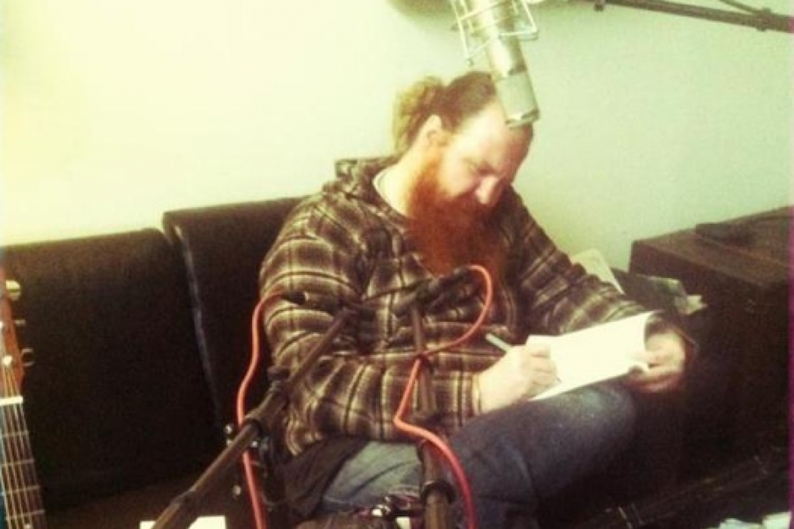Last month, in honor of the 20th anniversary of Radiohead’s “Creep,” SPIN ranked 10 of the enduring single’s most clicked cover versions. A week later, we received an e-mail from our No. 3, the so-called “Homeless Mustard,” whose stirring rendition for Sirius XM’s Opie and Anthony has racked up over 9 million YouTube views since he recorded it on a winter morning in 2009. As it turns out, Daniel Mustard not only has a roof over his head now, but a new EP, Fragments of Bone, which he funded by raising $16,262 on Kickstarter. We caught up with the cleaned-up artist to talk about the pros and cons of living with schizos, the parallels between busking and Kickstarting, and the song that helped pull him from “the depths of hell.”
The world’s introduction to you was as a homeless man beautifully covering Radiohead’s “Creep.” What do you remember about that experience?
I was living in [New York’s] Washington Square Park, a stinking drunken bum. I was brought onto show to participate in a gag they do called “Homeless Shopping Spree,” where they give homeless people a bunch of money and ship them out to a mall somewhere, the joke being how surburbanites respond. It was a nice alternative to going to central booking, which was my other option.
It was early in the morning. I was already drinking. I had a wake-up bottle of vodka, which you can see — the orange juice — sitting next to me in the clip. I didn’t know who Opie and Anthony were, or put any significance on where I was. I think they were looking for crazy people, and they were surprised to find someone relatively normal. I mentioned I play, write songs and sing, so they brought me a guitar.
I started off with my own song, “The Last Time We Met,” and they were blown away, so they said, “play a cover.” I used to play a whole set of them in the park every day, but I couldn’t remember any of those. I hadn’t owned a guitar in months, I was at my lowest point, and all I could think about was “Creep. ” I knew it well because it was significant to me when it came out 20 years ago and I was in high school.
What were the first signs that the video was becoming a bit of a phenomenon?
I played a few more songs, they gave me a bunch of money, and then I left. I went out and bought a big bottle of Svedka and a bag of socks and I didn’t think another thing of it. Three days later I was on Broadway and I approached this kid trying to a bum a cigarette, and he was like, “Hey, you’re Mustard!” Then he told me about the “Creep” clip and how it had hundreds of thousands of hits.
What really started to affect me was people contacting me through Facebook. That made me laugh and cry. I’d literally had 75 friends. Now I have two accounts and 8,000 friends. I received message after message from people all over, saying how much it affected them, how much it moved and inspired them. When you’re a bum living in a park, it’s like, “How the fuck could I be an inspiration to anyone?”
What did that song mean to you what does it mean to you now?
I always felt like a misfit in high school, and I went to a performing arts high school, which is a whole group of misfits, really. So I related to that feeling of inadequacy or unworthiness. It only occurred to me much later that it’d strike people as poignant to see a homeless man singing, “I’m a weirdo, what the hell am I doing here?”
Where are you living now? Did having an audience help you get clean?
When you’re homeless, you’re invisible to people — like literally. They will step over you, ignore you when you talk, look right through you. It’s a really haunting thing to experience every day. So to suddenly have people who wanted to know my name, who wanted details about my life…that was a huge influence.
I live in a shelter in Chelsea, on a bay with about 30 men. There are two bays per floor and about five floors, so it’s a strange environment to say the least. Most are just out of prison, and it’s a “mentally ill and chemically addicted” shelter, so it’s pretty rock’n’roll. There are lots of schizophrenics, who can be fun, but they do not forgive and they do not forget. That’s actually what “Last Time” is about.
There are three meals a day and a 10 p.m. curfew, which is kind of a pisser, because I might be at the studio and have to leave. All shows have to be booked at, like, 6 p.m. But having an audience helped me rediscover a will to live, which is the basis of all that “trying to get better.” Living in the park and staying shitfaced was my version of crawling into a hole and dying. I was trying to drink myself to death.
You funded your new Fragments of Bone EP via Kickstarter. Do you see a connection between that and busking in the street?
Absolutely! Don’t you? Spare change, man! Although I never made much busking. I’d play songs, and people would gather and listen and clap and even thank me, but they wouldn’t give me their money. I made more sitting on a piece of cardboard crying to myself. Kickstarter seemed like the logical thing to do. I had this audience who have been on this whole journey and struggle with me. They are part of it.
One backer bought the $450 “homeless walking tour.” Have you done it yet?
Well, she lives in California and is disabled, so she isn’t actually able to travel, but what we’ve done in lieu of that is shoot video of me giving a tour of the park and Greenwich Village — places that mean things to me — and we’ll put that together and send that to her, plus probably use the footage for something else too.
Ever hear from Radiohead’s camp? Or heard that they heard it?
I have not, and it’s my understanding Radiohead doesn’t do that song anymore. A lot of acts scoff at the music that made them famous. I never quite understood that. Me, I’ll probably be doing “Creep” for the rest of my life, and I think I’m okay with that. I know a lot of people who are still in the streets. There is nothing like this for them. There is no option, there is no road, there are no bootstraps.





